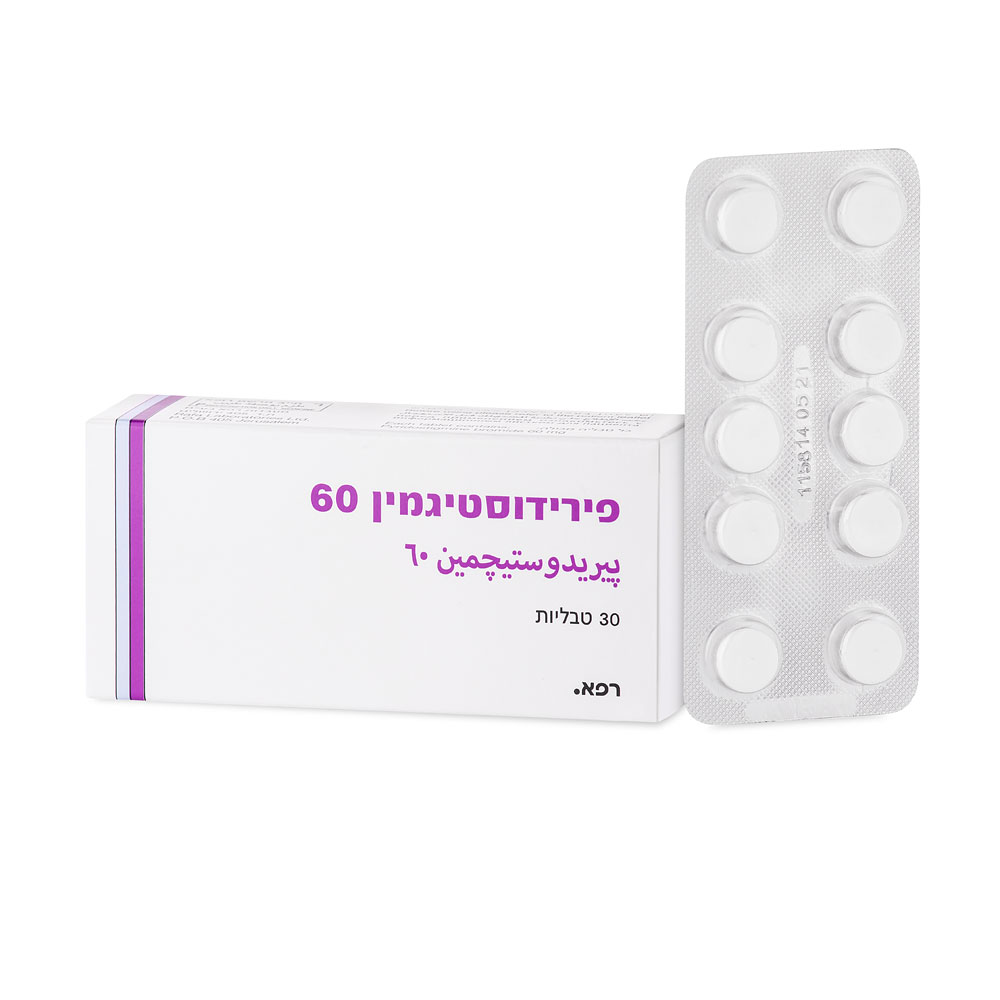Quest for the right Drug

פירידוסטיגמין 60 PYRIDOSTIGMINE 60 (PYRIDOSTIGMINE BROMIDE)
תרופה במרשם
תרופה בסל
נרקוטיקה
ציטוטוקסיקה
צורת מתן:
פומי : PER OS
צורת מינון:
טבליה : TABLETS
עלון לרופא
מינוניםPosology התוויות
Indications תופעות לוואי
Adverse reactions התוויות נגד
Contraindications אינטראקציות
Interactions מינון יתר
Overdose הריון/הנקה
Pregnancy & Lactation אוכלוסיות מיוחדות
Special populations תכונות פרמקולוגיות
Pharmacological properties מידע רוקחי
Pharmaceutical particulars אזהרת שימוש
Special Warning עלון לרופא
Physicians Leaflet
Pharmacological properties : תכונות פרמקולוגיות
Pharmacodynamic Properties
5.1 Pharmacodynamic properties Pharmacotherapeutic group: Cholinergics, cholinesterase inhibitors ATC code: N07AA02. Pyridostigmine is a reversible acetylcholinesterase inhibitor, the enzyme which metabolises and inactivates acetylcholine. It thus increases the concentration of acetylcholine at the neuromuscular junction of skeletal muscles. Pyridostigmine does not cross the blood-brain barrier and has a longer effect than neostigmine. The onset of effect is somewhat slower than in the case of neostigmine, generally after 30 to 60 minutes. In comparison to neostigmine, the muscarinic components and the risk of associated adverse reactions are less pronounced in the case of pyridostigmine.
Pharmacokinetic Properties
5.2 Pharmacokinetic properties Absorption Peroral pyridostigmine bromide was poorly absorbed at about 22-25%. The rate and extent of absorption show wide inter-individual differences. When administered in healthy volunteers at oral daily doses of 120 mg, 120-370 mg and 180-1440 mg, the oral bioavailability of pyridostigmine bromide was 7.6%, 18.9% and 3-4% with Cmax of 40-6 μg/l, - μg/l a d 8 μg/l at t a of -4 h, 1.5-6 h and 1.5 h, respectively. The low and highly variable bioavailability across studies is attributed to the low absorption rate of pyridostigmine bromide. In patients with myasthenia gravis, the bioavailability can decrease to 3.3%. Distribution Pyridostigmine is not bound to plasma proteins. The apparent volume of distribution after intravenous administration was 1.03 l/kg to 1.43 l/kg in healthy subjects, 1.76 l/kg in patients with myasthenia and 0.53 l/kg to 1.1 l/kg in surgery. The concentration of pyridostigmine in breast milk has been found to be 36-113% compared to maternal plasma, which implies a very low dose to the nursing infant (approximately 0.1% of the dose per kilogram body weight taken by the mother). Biotransformation Pyridostigmine is metabolized only to a small extent. It is hydrolysed by plasma cholinesterases. The main metabolite of pyridostigmine is the hydrolysis product 3-hydroxy-N-methyl pyridinium. Elimination The plasma clearance occurs very quickly at 0.65 l/h/kg in healthy subjects, 0.29 to 1.0 l/h/kg in patients with myasthenia and 0.52 to 0.98 l/h/kg in patients following surgical interventions. Intravenously administered pyridostigmine is mainly excreted by the kidney (75-90%) as parent compound and as inactive metabolites at a ratio of approximately 4:1. A total of 5-15% of oral doses is dose-dependently excreted by the kidneys as parent compound, thus reflecting the low degree of oral pyridostigmine absorption. After intravenous administration, the apparent terminal elimination half-life was 1.51-1.74 h in healthy volunteers, 1.05 h in myasthenic patients and 0.38-1.86 h in surgical patients respectively.

שימוש לפי פנקס קופ''ח כללית 1994
Myasthenia gravis
תאריך הכללה מקורי בסל
01/01/1995
הגבלות
תרופה שאושרה לשימוש כללי בקופ'ח
מידע נוסף
